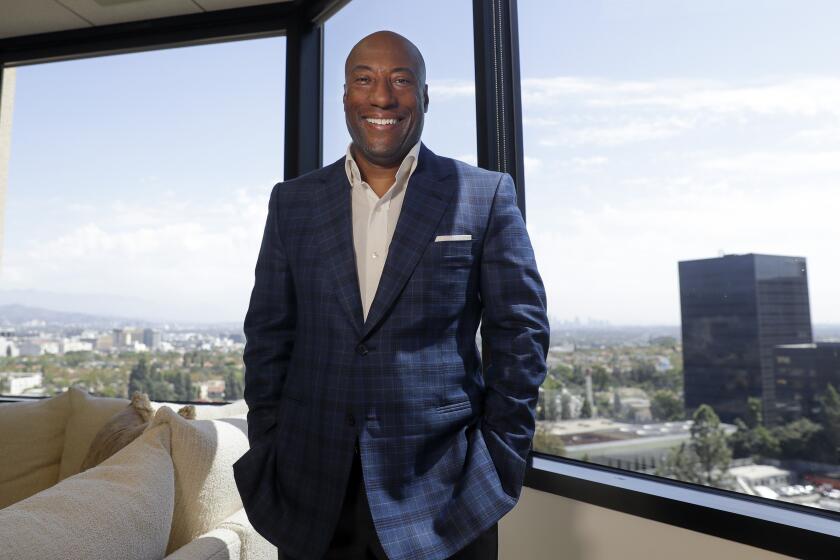For Twitter, it’s an ideal IPO market
- Share via
If the initial public offering of Twitter Inc. had to be summed up in one of the company’s famously pithy tweets, this would be it: The timing couldn’t be better.
Twitter is expected to make its public debut Thursday in one of the hottest IPO markets in years. And Wall Street is paying close attention.
The New York Stock Exchange wants a smooth opening to assert its dominance against rival Nasdaq, which was panned for last year’s glitchy IPO for Facebook Inc. Investors want a surge in the stock that could strengthen the tech sector’s rise this year. And investment bankers want a successful IPO that could push other technology companies to accelerate their own plans to go public.
“The IPO market is entering this very exuberant stage now,” said Josef Schuster, founder of IPO research firm IPOX Schuster in Chicago. “It has been huge. There’s no doubt about it.”
San Francisco-based Twitter announced Wednesday that it would raise up to $1.8 billion by selling 70 million shares at a price of $26.
That would value the micro-blogging company at roughly $18 billion. It originally planned to sell at a range of $17 to $20 under the ticker symbol TWTR.
New offerings are at their highest level since 2007, propelled by this year’s roaring stock market rally. The Dow Jones industrial average notched the latest in a series of record highs Wednesday, and is up more than 20% since Jan. 1.
Like the rest of the stock market, IPOs are getting an enormous boost from the easy-money policies of the Federal Reserve. Investors seeking alternatives to low-yielding bonds have poured into IPOs on the belief that the central bank will keep the economy aloft.
Twitter has both benefited from the IPO frenzy and helped to stoke it further.
So far this year, there have been 195 initial offerings that have raised nearly $50 billion, according to researcher Dealogic. That’s a fraction of the IPO heyday of the dot-com boom. Nearly 1,000 companies went public in 1999 and 2000.
But the IPO market is at its healthiest since 2007, when $65.4 billion was raised in 288 deals.
And investors are making a mint.
An IPO index created by Schuster’s firm has bolted 37% higher this year, outpacing even the 30% jump in the technology-laden Nasdaq composite index.
Investors’ infatuation, however, has raised concerns that the new-issue market may be getting ahead of itself.
Investors are paying a premium for IPOs and becoming less discriminating in what they buy, according to research by Jay Ritter, a University of Florida finance professor. IPOs have commanded a median price-to-sales ratio of 5 this year, the highest since a ratio of 6 in 2007, according to Ritter.
And 61% of the companies that have gone public lost money in the preceding 12 months. That’s the most since the dot-com boom in 2000, when 81% of companies were in the red, Ritter said.
Some experts are troubled by huge first-day jumps in new stocks.
Six new issues have doubled in price on their debuts this year, according to Dealogic. That includes seemingly routine businesses such as a sandwich maker, Potbelly Corp., and a home organizing chain, Container Store Group Inc.
“I just don’t see this as a high-growth business,” Ritter said of Container Store Group. “That’s a company I kind of scratch my head about.”
Twitter’s IPO will mean a lot to the NYSE, which snagged the listing in the aftermath of last year’s botched IPO of Facebook Inc. on the Nasdaq Stock Market.
The highly anticipated Facebook offering was marred by a computer glitch that couldn’t match buy and sell orders. Nasdaq’s system was overwhelmed by high trading volume and many customers didn’t even know whether their trading orders had been executed.
The NYSE has conducted tests to ensure a smooth debut of Twitter, even doing a dress rehearsal one weekend last month.
“The company’s going to feel really good about it,” said David Ethridge, who oversees IPOs at the exchange. “The public’s going to feel really good about it.”
The public launch of Twitter also will test small investors’ faith in Wall Street.
Individuals have been slow to return to the stock market after the financial crisis. And some people who did return were burned in the Facebook debacle.
“The markets really cannot take another big hit to investor confidence,” said Dennis Kelleher, president of Better Markets Inc., a Washington-based investor advocacy group. “The risk is not just to the company or the markets. The real and lasting risk is yet another hit on investors’ confidence.”
More to Read
Inside the business of entertainment
The Wide Shot brings you news, analysis and insights on everything from streaming wars to production — and what it all means for the future.
You may occasionally receive promotional content from the Los Angeles Times.










